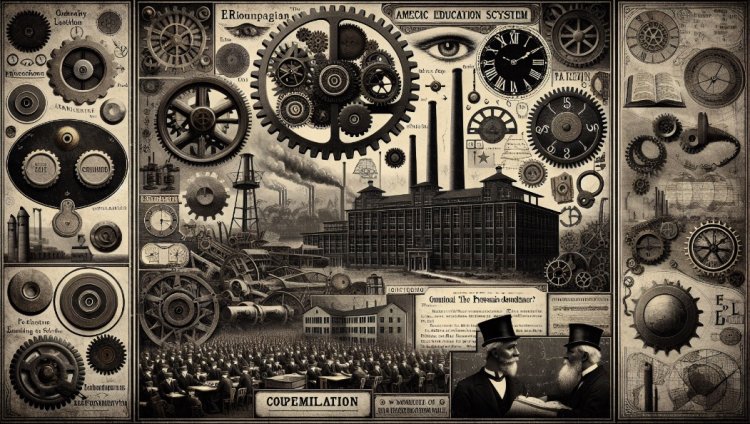The Dark Origins of the American Education System
Uncover the unsettling truth! Dive into the dark origins of the American education system, from colonial control to industrial conditioning. Rethink everything you thought you knew about school.

Introduction
The Industrial Revolution in the late 1800s created a need for workers in factories and industries. However, the majority of the American population at the time lived simple lives in rural areas and lacked the necessary skills for these jobs. To address this labor problem, education became crucial.
Education played a significant role in solving the labour problem during the Industrial Revolution. It was necessary to educate the masses on a massive scale for them to become skilled workers. The American public needed to be conditioned and trained to work in factories and industries, to clock in and out, and to follow orders obediently.
One of the key figures in shaping the American education system was John D. Rockefeller. As a wealthy tycoon, Rockefeller saw the importance of education in creating a compliant workforce. He played a substantial role in funding the development of the public school system, and providing free education to the American population.
However, the true intention behind Rockefeller's funding was not to provide a well-rounded education that would empower individuals to think critically but rather to condition them to be obedient workers. The education system was designed to teach just enough to keep the wheels of industry turning while discouraging ambition and independence.
Rockefeller's influence extended beyond funding public schools. He also shaped the curriculum and standardized education, ensuring that the content taught aligned with the needs of industrialism. The education system became a tool for conditioning and obedience, molding generations of workers who would accept mediocrity and prioritize the interests of their employers.
The Prussian Model
The education system in America has deep roots in the Prussian Empire. The Prussian Empire, which encompassed modern-day Germany, had a significant influence on shaping the American education system in the late 1800s.
Explanation of the Prussian Empire and their control over Poland
In the late 1700s, Prussia invaded Poland and successfully occupied the country. However, they faced a challenge in getting the Polish population to accept their new German rulers. The Prussians recognized that they couldn't change the minds of the adults who were proud of their Polish identity, so they turned their attention to the children.
The Prussian education system and its purpose
To exert control and diminish Polish culture, the Prussians implemented a new eight-year education system in Poland. While children learned the basics of reading and writing, they were also taught to listen to orders, respect authority, and be obedient to their Prussian rulers. The aim of the education system was to destroy free will, ensuring that the Polish children would grow up as submissive citizens of the Prussian Empire.
How the Prussian model aimed to destroy free will
Prussian philosopher Johann Fichte described the education model by stating that it should be aimed at destroying free will so that individuals would be incapable of thinking or acting otherwise throughout their lives. The goal was to create a population that would be secure without the need for armies or policemen, as they would be conditioned to follow orders without question.
The effectiveness of the Prussian education system in molding the population
The Prussian education system proved to be highly effective in molding the population according to the desires of their rulers. By instilling Prussian patriotism and obedience from a young age, the Polish children grew up as loyal subjects of the German monarchy. The success of this model caught the attention of influential American politician Horace Mann.
Exporting the Prussian Model to America
The American education system underwent significant reform in the 1800s, thanks in part to the efforts of Horace Mann, an influential American politician. Mann was passionate about education and sought to improve the American education system to meet the needs of industrialism.
In his quest for educational reform, Mann embarked on a journey to Europe, where he visited various schools to gather ideas and inspiration. It was during this trip that Mann became fascinated with the Prussian model of education.
The Prussian model, which had been implemented in the late 1700s in Poland, aimed to exert control and diminish Polish culture. The education system in Prussia taught children to listen to orders, respect authority, and be obedient to their rulers. Mann saw the potential of this model in shaping the American population to be compliant workers.
Upon returning to America, Mann advocated for the implementation of the Prussian model in American public schools. With the support of influential figures like John D. Rockefeller, Mann's vision became a reality.
The Prussian model was gradually implemented in American public schools, transforming the education system. Schools were divided into separate classes for children of different ages, and the curriculum was standardised to align with the needs of industrialism.
American society embraced and widely accepted the Prussian model. It became the foundation of the American education system, shaping generations of workers who prioritised obedience and conformity.
By conditioning the American population from a young age, the Prussian model ensured that individuals would grow up to be submissive citizens, focused on serving the interests of their employers. The success of this model can be seen in the prevalence of standardised testing, the emphasis on obedience in schools, and the prioritisation of conformity over critical thinking.
Today, the legacy of the Prussian model can still be seen in the American education system. It serves as a reminder of the dark origins of our education system and the importance of questioning the status quo.
Infiltration of Education by Business Tycoons
In the late 1800s, the American education system faced a significant challenge. The Industrial Revolution created a need for a skilled workforce, but the majority of the population lacked the necessary skills for these jobs. Business tycoons like John D. Rockefeller and Friedrich T. Gates saw an opportunity to address this issue and shape the education system to their advantage.
John D. Rockefeller, a wealthy tycoon, played a crucial role in the creation of the General Education Board. This board, with a name that sounded official and unbiased, was actually a tool for Rockefeller to advance his agenda. The true purpose of the board was not to provide a well-rounded education that would empower individuals but rather to condition them to be obedient workers.
The General Education Board provided funding for public schools, high schools, and universities. By offering free education to the American population, Rockefeller and other business tycoons were able to control the curriculum and shape the content taught in these institutions. The education system became a means of conditioning and obedience, with a focus on teaching just enough to keep the wheels of industry turning.
Rockefeller's influence was not the only one infiltrating the education system. Other wealthy individuals, like Andrew Carnegie, also poured billions of dollars into shaping the American education system to suit their needs. These business tycoons saw education as a means to create a compliant workforce, rather than empowering individuals to think critically and pursue their ambitions.
Their efforts resulted in the widespread adoption of the Prussian model, which aimed to condition individuals to be obedient and follow orders without question. Prussia used this strategy in Poland in the late 1700s, and it was very successful at shaping the populace to suit their rulers' preferences.
Horace Mann, an influential American politician, played a significant role in exporting the Prussian model to America. He saw the potential of this model in shaping the American population to be compliant workers and advocated for its implementation in American public schools.
With the support of business tycoons like Rockefeller and the influence of Mann, the Prussian model gradually took over the American education system. Schools were divided into separate classes for different ages, and the curriculum was standardised to align with the needs of industrialism.
Today, the legacy of this infiltration can still be seen in the American education system. The emphasis on obedience, conformity, and standardised testing reflects the dark origins of our education system. It serves as a reminder of the influence that business tycoons had on shaping education to serve their interests, rather than the empowerment and critical thinking of individuals.
Standardisation and control
Before the involvement of business tycoons, there was a lack of a standard curriculum in the American education system. Each school had its own way of teaching, resulting in inconsistent education across the country. This lack of standardisation made it difficult for students to transition between schools and for employers to assess the skills of potential workers.
To address this issue, business tycoons like John D. Rockefeller stepped in and provided funding for standardised tests and textbooks. They believed that by standardising education, they could ensure that students were taught the specific knowledge and skills needed for the industrial workforce. These standardised tests and textbooks became the basis for evaluating students' abilities and measuring their academic progress.
In addition to funding standardised tests and textbooks, business tycoons played a significant role in establishing the Department of Education. By influencing education policy and funding, they gained control over the curriculum and content taught in schools. This allowed them to shape the education system to meet the needs of industrialism and ensure a steady supply of obedient workers.
However, the impact of standardisation and control on education has not been without consequences. One of the major drawbacks is the impact on creativity and individuality in education. Standardised tests and curricula often prioritize rote memorization and regurgitation of information, leaving little room for critical thinking and creativity. This can limit students' ability to think independently and develop their unique talents and interests.
Furthermore, the emphasis on standardised tests has led to a narrowing of the curriculum, with subjects like art, music, and physical education being deprioritized in favour of subjects that are tested. This can have a detrimental effect on students' overall development and well-being.
Overall, while standardization and control in the American education system have helped address the labor problem during the Industrial Revolution, they have also had negative consequences. It is important to strike a balance between standardization and allowing for creativity and individuality in education. By valuing both conformity and critical thinking, we can create an education system that prepares students for the workforce while also empowering them to think independently and pursue their passions.
Modern-Day Consequences
The dark origins of the American education system have had lasting consequences for society today. While the system was designed to create a compliant workforce during the Industrial Revolution, its effects are still felt in modern times.
One of the modern-day consequences is the perpetuation of the Rockefeller motto: a nation of workers, not thinkers. The education system continues to prioritize obedience and conformity over critical thinking and independent thought. Students are conditioned to follow orders and accept mediocrity rather than pursue their own ambitions and think for themselves.
Another consequence is the failure of the education system to prepare individuals for real-life skills. Despite spending years in school, many students graduate without the practical knowledge needed for adulthood. They may lack basic skills such as financial literacy, problem-solving, and interpersonal communication. This gap between education and practical knowledge can lead to difficulties in navigating the real world.
The disparity between education and practical knowledge is further exacerbated by the high value placed on college degrees. In today's society, a college degree is often seen as the key to success and financial stability. However, this emphasis on higher education can overlook the importance of vocational training and other forms of skill development. Many individuals who are unable or choose not to pursue a college degree may face limited opportunities and societal judgment.
In conclusion, the modern-day consequences of the dark origins of the American education system are numerous. From perpetuating a nation of workers to the failure to prepare individuals for real-life skills, the impact of the education system is profound. It is important to question and challenge the status quo to create a more equitable and empowering education system for future generations.
Escaping the System
If you're tired of being a docile worker and want to break free from the constraints of the American education system, there is hope. One way to do this is by finding a high-paying work-from-home job. These types of jobs offer the flexibility and freedom that traditional employment often lacks.
Work-from-home jobs have several advantages over traditional entrepreneurship. First, they allow you to bypass the challenges and risks associated with starting your own business. With a work-from-home job, you can focus on what you do best and leave the administrative and financial aspects to someone else. This can save you time, money, and stress.
Secondly, work-from-home jobs often require less upfront investment and expertise compared to traditional entrepreneurship. Many of these jobs can be learned on the job without the need for a formal degree or extensive experience. This opens up opportunities for individuals who may not have had access to higher education or who are looking to switch careers.
If you're interested in landing a work-from-home job without a degree or experience, there are strategies you can use to increase your chances of success. One effective strategy is to showcase your skills and expertise through freelancing or volunteer work. This can help you build a portfolio and gain valuable experience that you can highlight during the job application process.
Networking is another important strategy for landing a work-from-home job. Connect with professionals in your desired industry through online platforms and industry events. Building relationships and demonstrating your passion and dedication can often lead to job opportunities, even if you don't have the traditional qualifications.
Finally, consider investing in resources that can help you navigate the work-from-home job market. One such resource is the 'Exploit the System' masterclass. This comprehensive course provides over 90 lessons on how to go remote and land high-paying work-from-home jobs. It covers everything from choosing the right job for you to learning the necessary skills, crafting a standout resume, and acing job interviews.
The 'Exploit the System' masterclass is designed to give you the tools and strategies you need to escape the traditional education system and find success in the work-from-home job market. With the techniques taught in this course, you can show employers that you have the experience and skills necessary for the job, even if you don't have a degree or extensive experience.
So if you're ready to break free from the system and create a better quality of life for yourself, consider investing in the 'Exploit the System' masterclass. It is a small investment that can potentially lead to a high-paying work-from-home job that offers the flexibility, freedom, and financial success you desire.
Conclusion
In conclusion, the dark origins of the American education system have had a profound impact on society today. The system was designed to create a compliant workforce during the Industrial Revolution, and its effects are still felt in modern times.
It is important to reiterate the impact of the dark origins of the education system. The system was designed to condition individuals to be obedient workers, prioritizing conformity over critical thinking. This has led to a nation of workers, rather than a nation of thinkers.
However, it is important to question the system and seek alternative paths. The education system may not be the only route to success and fulfillment. Individuals should explore work-from-home opportunities, which offer flexibility and freedom that traditional employment often lacks.
Work-from-home jobs have several advantages, such as bypassing the challenges and risks of starting a business and requiring less upfront investment and expertise. It is possible to land a high-paying work-from-home job without a degree or extensive experience by showcasing skills and networking with professionals in desired industries.
To navigate the work-from-home job market successfully, individuals can consider investing in resources such as the 'Exploit the System' masterclass. This comprehensive course provides strategies and tools for going remote and landing high-paying work-from-home jobs.
By questioning the system, exploring alternative paths, and taking advantage of work-from-home opportunities, individuals can break free from the constraints of the American education system and create a better quality of life for themselves.
FAQ
Common questions about the education system's origins
Q: What were the origins of the American education system?
The American education system originated during the Industrial Revolution in the late 1800s. It was created to address the need for a skilled workforce in factories and industries.
Exploration of alternative education options
Q: Are there alternative education options to the traditional public school system?
A: Yes, there are alternative education options available. These include homeschooling, private schools, charter schools, and online education programs.
Discussion on the value of self-education
Q: Is self-education valuable?
A: Yes, self-education can be highly valuable. It allows individuals to pursue their own interests, learn at their own pace, and develop skills that are relevant to their personal and professional goals.
Tips for finding work-from-home opportunities
Q: How can I find work-from-home opportunities?
A: Here are some tips for finding work-from-home opportunities:
-
Showcase your skills and expertise through freelancing or volunteer work to build a portfolio.
-
Network with professionals in your desired industry through online platforms and industry events.
-
Consider investing in resources like the 'Exploit the System' masterclass, which provides strategies for landing high-paying work from home jobs.
-
Search for remote job listings on reputable job boards and websites.



 admin
admin 










